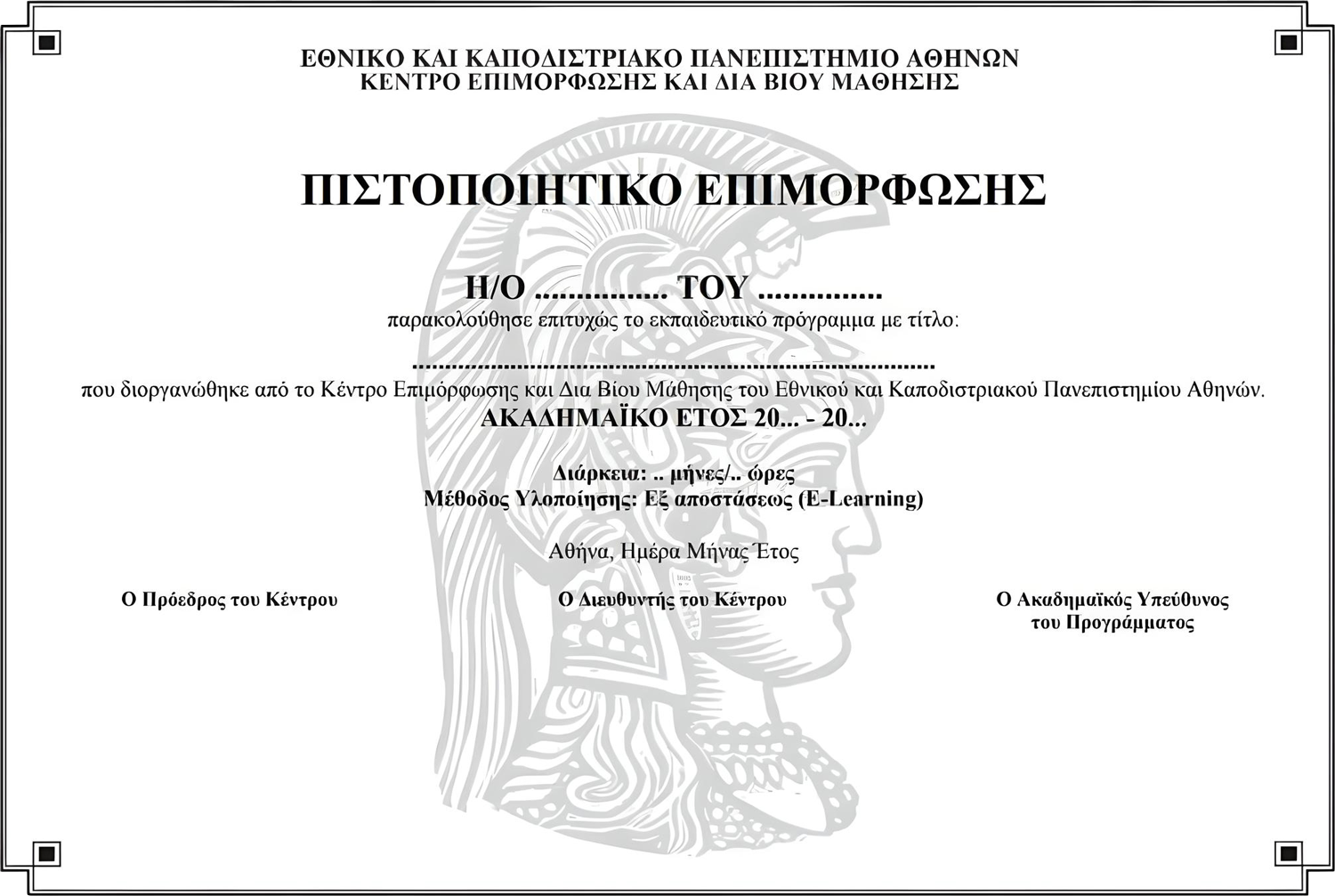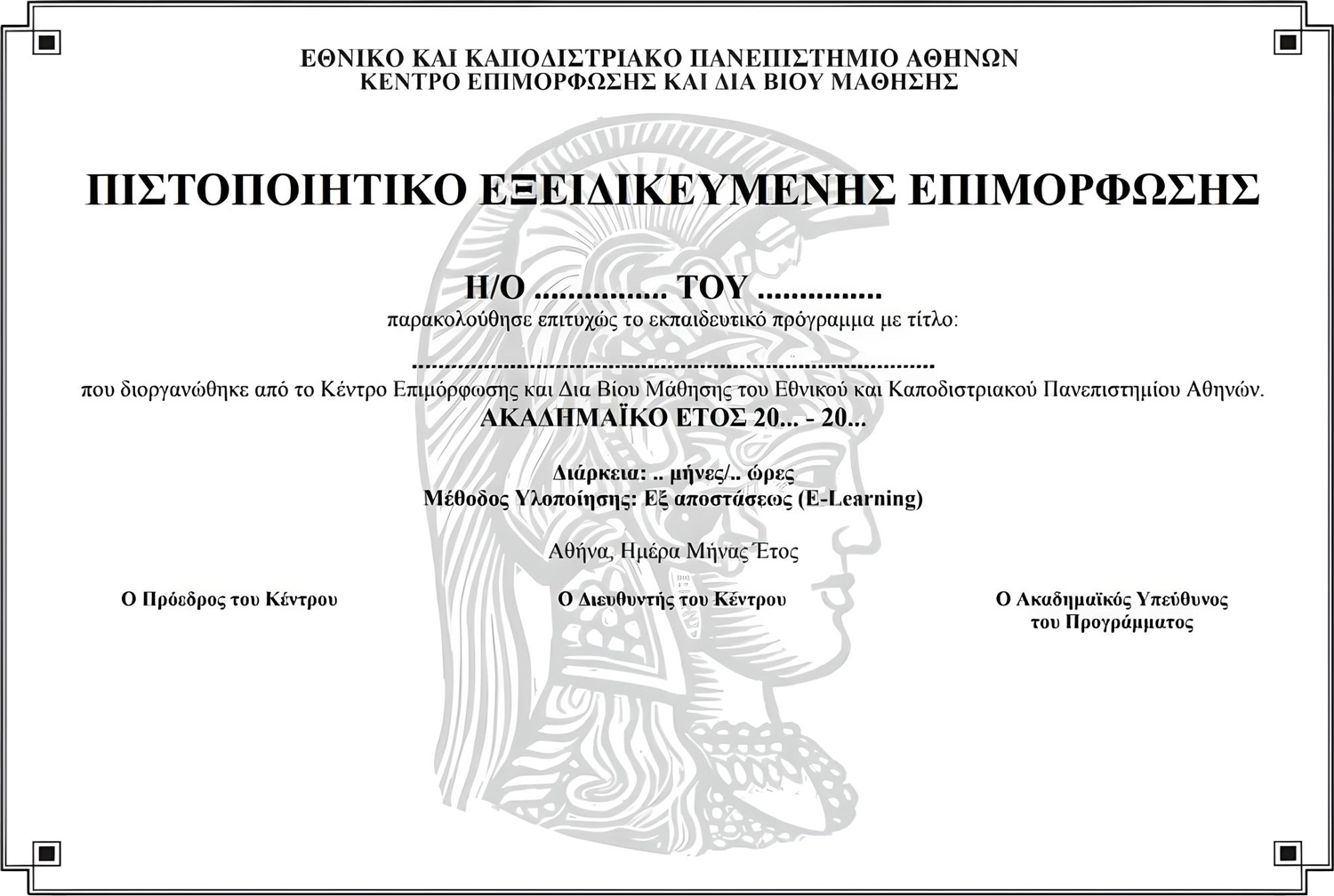Finance for Non-Financial Executives
-5% for Early Entry until 8/1/2025
Application until 27 Jan. 2025

-
Mode of Study
Distance Learning
-
Duration
5 Months
-
Credits
16 ECVET
-
Tuition Fees
600€ (without discount)
Program Objectives
The objective of the “Finance for Non-Financial Executives” program is to provide theoretical and practical training for business and organization executives who lack financial knowledge.
The program covers topics in economics, accounting, and corporate finance, enabling participants to understand the impact of their decisions on the performance and value of their organizations.
Specifically, the program begins with an introduction to economics for non-economists, designed for executives who may not have a strong financial background. This is followed by essential quantitative methods for business decision-making and a necessary introduction to finance and accounting.
Subsequent modules delve into financial statements and their analysis, familiarizing participants with concepts of risk and return, bond valuation, modern portfolio theory, capital cost analysis, and investment program evaluation.
Training Cycle Calendar
-
27/1/2025
Application Deadline
-
30/2/2025
Program Start Date
-
4/2025
Certificate Award
During Christmas, Easter, and the month of August, the Executive Program is temporarily suspended.
Who Should Attend
The “Finance for Non-Financial Executives” Executive Program is designed for mid- and senior-level executives who do not have a financial background but require practical, work-related knowledge of accounting and corporate finance to make effective business decisions.
Skills You Will Gain
By completing the “Finance for Non-Financial Executives” Executive Program, participants will gain multiple benefits. Graduates will be able to:
Identify the factors influencing financial and accounting decisions.
Recognize the complexity and interdependence of financial issues.
Collect, organize, and analyze financial data.
Explain the core functions of finance and accounting.
Plan, propose, and evaluate various financial activities within a business.
Analyze asset valuation models.
Explain how to calculate the net present value (NPV) of an investment project.
Differentiate between various capital sources and their impact on a company’s value.
Describe the operation of the financial system.
Explain the fundamental principles of modern portfolio theory.
Course Modules
Total Duration: 5 Months Teaching Hours: 400
Economics for Non-Economists
2 WeeksBasic economic concepts
Inflation and interest rates
Economic cycles
Money and banking system
The international financial system
Quantitative Methods for Business Decision-Making
2 WeeksIntroduction to data and business problem-solving
Population and sample concepts, tools for descriptive data analysis
Confidence intervals
Hypothesis testing for managerial decisions
Variance analysis in the economic environment
Introduction to Finance and Accounting
2 WeeksThe science of accounting and its importance
Internal and external accounting information for decision-making
Financial system
Time value of money
Financial Statements – Balance Sheet, Income Statement, Cash Flow Statement, and Statement of Changes in Equity
2 WeeksImportance of financial statements
Balance sheet
Income statement
Cash flow statement
Statement of changes in equity
Financial Statement Analysis
2 WeeksHorizontal, common-size, and trend analysis
Ratio analysis
Break-even analysis
Risk and Return
2 WeeksComponents of return
Sources of risk
Estimating return and risk
Money and Capital Markets – Bond and Stock Valuation
2 WeeksMoney market instruments
Capital market instruments
Bond valuation
Relationship between interest rates and bond prices
Stock valuation
Modern Portfolio Theory
2 WeeksExpected return and risk of a portfolio
Efficient portfolios
Single-index model
Systematic and unsystematic risk
Asset pricing model
Cost of Capital
2 WeeksFundamental concepts of a company’s cost of capital
Cost of debt securities
Cost of equity
Weighted average cost of capital (WACC)
Investment Program Evaluation
2 WeeksInvestment evaluation methods
Payback period method
Net present value (NPV) method
Internal rate of return (IRR) method
Discount Categories
-
Category A – 10% Discount
Unemployed individuals
Persons with disabilities
Employees of universities and research centers
Groups of three or more participants from the same organization
-
Category B – 5% Discount
Early registration up to one month before the application deadline
Full tuition payment before the program start date
Please note that the above discount categories cannot be combined. If a participant qualifies for both categories, only the higher discount will be applied.
Certificate
Successful completion of the program leads to the award of a certificate, which includes the program title and the exact number of training hours. Depending on the program, the awarded certificate may be:
Europass / ECVET Certificate Supplement
The Europass / ECVET Certificate Supplement is a document that accompanies the training or specialized training certificate awarded upon program completion.
It provides a detailed description of the training program, including the course modules, duration, admission requirements, assessment process, learning outcomes, and the skills and competencies acquired.
It enhances the value of the awarded training or specialized training certificate and can be used by graduates for employment opportunities, career advancement, or further studies.
Methodology
-
Training Method
Distance learning (e-learning) through an interactive platform.
-
Platform Features
User-friendly, includes e-books, interactive content, multimedia, self-assessment, and livestreaming.
-
Structure
Learning modules with study guidelines.
-
Content
Objectives, outcomes, keywords, introduction, main text, examples, case studies, exercises, audiovisual material, slides, summary.
-
Support
Continuous communication and livestream meetings with instructors.
-
Assessment
Self-assessment, exercises, and final evaluation with multiple-choice questions and the option for retaking.
Contact
-
210 368 9430
Executive Programs Secretariat, Monday to Friday (11:00 – 17:00)
-
executive-programs@econ.uoa.gr
Contact via email
-
Sofokleous 1 Street
Executive Programs Secretariat, Monday to Friday, 11:00 – 17:00, at Grypareion Megaron, Sofokleous 1, 5th floor, Office 518, Athens, Postal Code 10559


